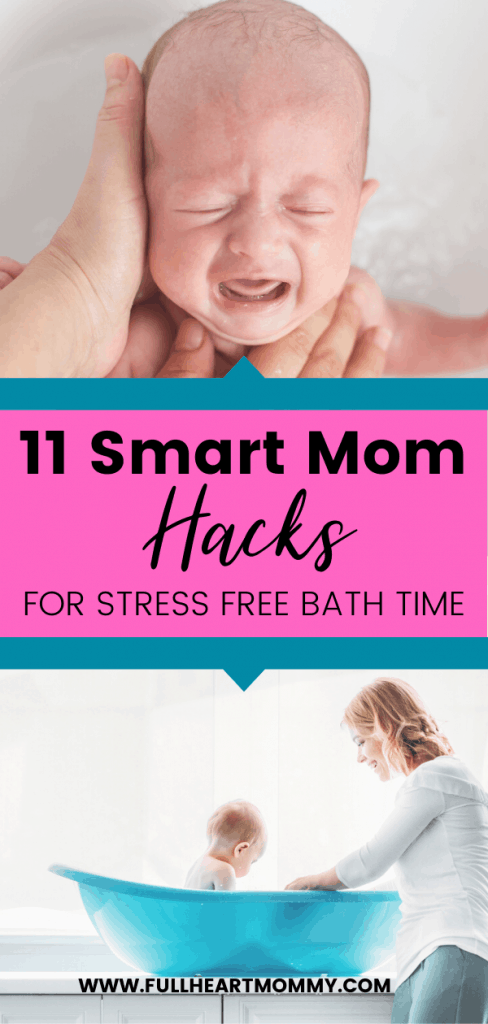Did your baby’s first bath go as you planned? Maybe you imagined giving your little baby a soothing bath and wrapping them up all nice and cuddly afterward. Surely you didn’t imagine that you’d be wondering why your baby hates baths?
In reality, if you wound up with a screaming baby and a traumatic experience, it can be easy to think you’re doing something wrong.
If your baby hates baths, you are not alone! Luckily, there are some things you can do to pinpoint some reasons why your baby is uncomfortable. Then we can try some solutions for a tear-free bath!
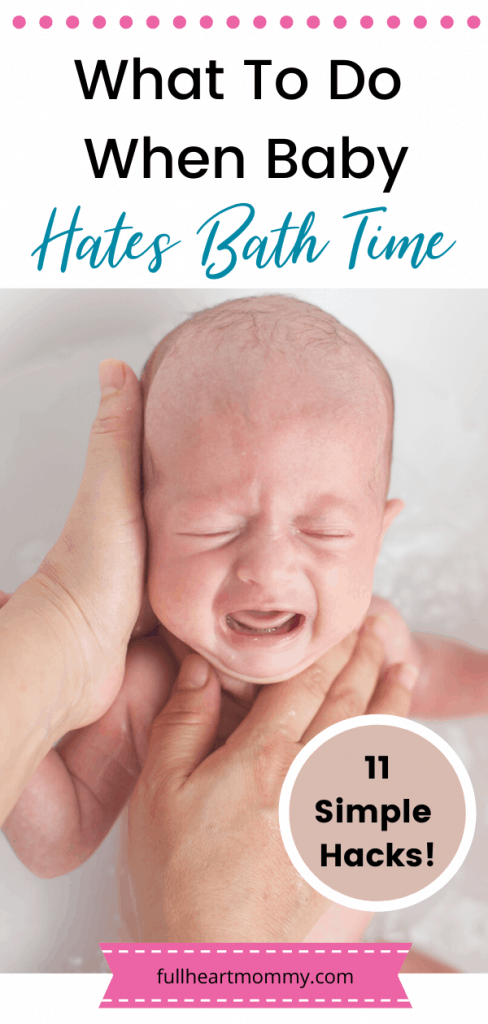
Why Does My Baby Hate The Bath? 4 Reasons
It can be helpful to observe your baby’s behavior during bath time to get a sense of what may be causing their behavior.
As with anything baby related, one size does not fit all. Take note of their age, routine and developmental stage. With that being said, here are some possible reasons your baby hates the bath.
1. Fear of water: Some babies can feel overwhelmed by the sensation of water on their skin
2. Temperature: If the water is too hot or cold, this can definitely cause your baby to feel discomfort.
3. Discomfort: If your baby has a diaper rash or other skin irritations, the water could cause discomfort as well.
4. Fear: Some older babies may be afraid of being under the water or have a fear of water being poured over their heads.
Crying After Bathtime
If your baby is crying or screaming after a bath, it can be hard for you to hear.
Babies get cold quickly and the sensation of cool air after transitioning from out of the water can definitely make them cry.
If your baby is overtired, bath time can be overwhelming and frustrating.
The entire experience is full of sensory activities and sensations. This includes the noise of running water, the feeling of being wet, and then getting toweled off.
How To Make Baby Bath Time Easier
Want to know how to calm a newborn during baths? Consider that this whole world and these everyday experiences are all brand new to a baby.
However, this phase and most other fussy baby phases will pass. If your baby is crying during or after their bath, these tips will help them and you have a more enjoyable experience.
1. Pay attention to the water temperature
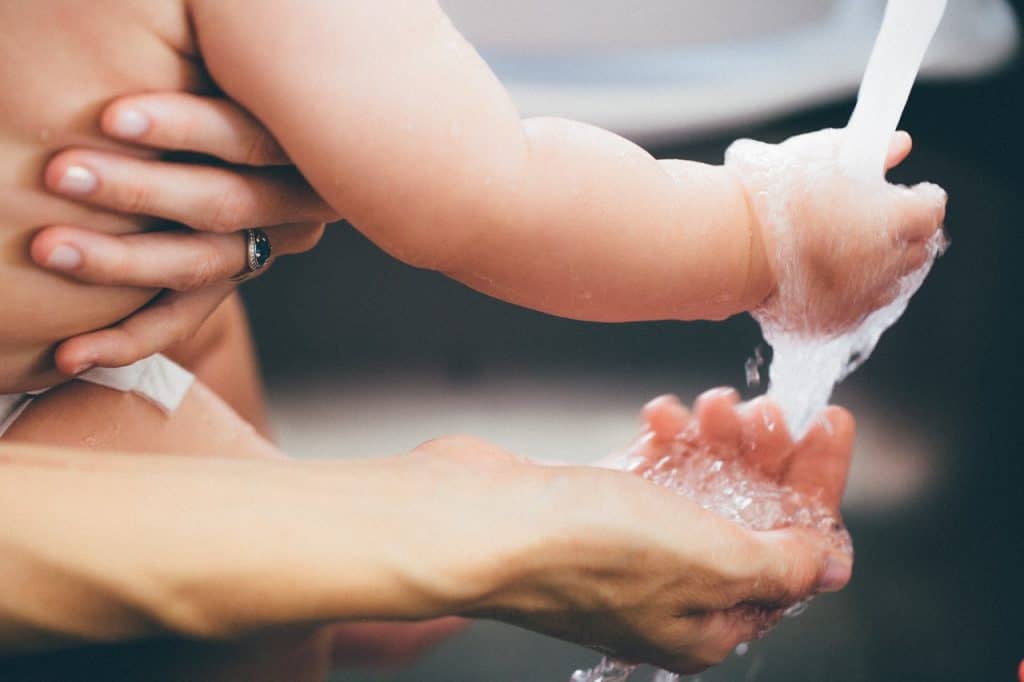
The temperature of the bath water is very important! Water that’s too hot will scald your baby and water that’s too cold will be very chilly and unpleasant. What’s hot to you as an adult may feel very different from your little one’s perspective. My mother-in-law got me a baby bath and room thermometer and it was honestly a game changer. I didn’t have to second guess if the water was just right.
2. Lay out clothing and diapers beforehand
You don’t want to scramble around looking for an outfit and fresh diaper once your baby is out of the tub! Laying these things out before you even start the bath will ensure a smooth transition from the tub to the towel, to clothes or pajamas.
3. Use unscented soap

Irritating your baby’s sensitive skin is definitely is not the way to go! There are so many nice, scented baby soaps out there, but using a fragrance free baby wash is the way to go during the early months.
A gentle cleanser will be free from extra chemicals and will be safe and effective. Plus, you want to try and keep that wonderful new baby smell as long as possible!
Related: Best Natural Wipes For Every Baby
4. Warm the Bathroom Up First
You can warm the bathroom up before you even get started so that the transition into the room is effortless. There are two ways you could go about it. First, you could take a shower or bath yourself. Or you could use a small space heater, safely away from the tub, sink or water sources. Position it slightly outside the bathroom door so that it can push warm air in.
5. Use a shower wand for rinsing and washing

The sound or sensation of gushing water straight from the faucet may be too much for your baby. Using a shower wand can control the flow of water for babies and allow a more moderate spray of water.
6. Time the bath around feedings
One way to ensure that your baby hates baths is to try and bathe them when they’re hungry! A well fed baby may be easier to soothe than an unsatisfied baby craving milk.
7. Use a bath cap

A bath cap or visor prevents water from going into your baby’s faces and eyes. This allows for easier hair washing and you don’t have to worry about soap getting into their eyes.
8. Try singing or talking
Is there a familiar song or tune you always sing to your baby? Sing it now! The familiar tune will help comfort them. If you’re not into singing, then you can also play music. Also try talking them through the bath time experience in a calm, soothing voice.
9. Use a baby bath pillow or infant tub
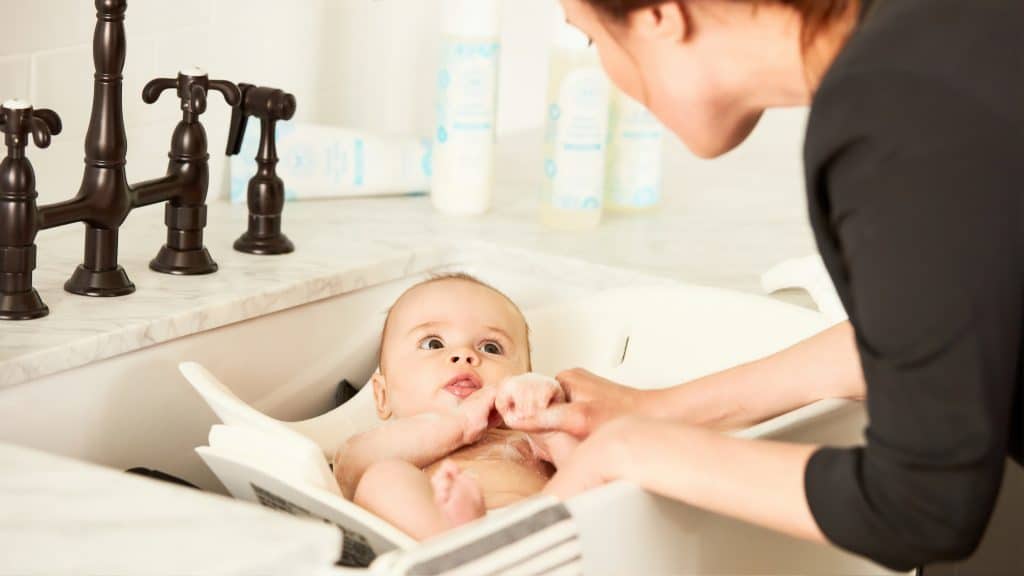
Your newborn baby will be too small to take a bath in a regular sized tub anyway. Using a baby bath pillow or baby tub is comfortable and safe for them. Some bath pillows are soft cushions designed to fit into a sink. This might be a better transition to a large tub. A bonus of this method is that sinks are usually counter height, so no bending for parents!
10. Bathe together
The benefits of skin to skin for your baby can include bonding, less crying, safety, and temperature control. It makes sense to try and bathe with them if your baby hates baths! Your touch and presence can calm your little one down and you’ll both get clean.
11. Bath Toys

If your baby is a little older, out of the newborn stage, and still is not a fan of tub time, toys can help. They provide great little distractions while also helping your baby learn hand- eye coordination. Try to avoid toys with little holes that can water can get inside of and mildew. Regularly check your baby’s bath toys and replace them if necessary.
Important Baby Bathing Safety Tips
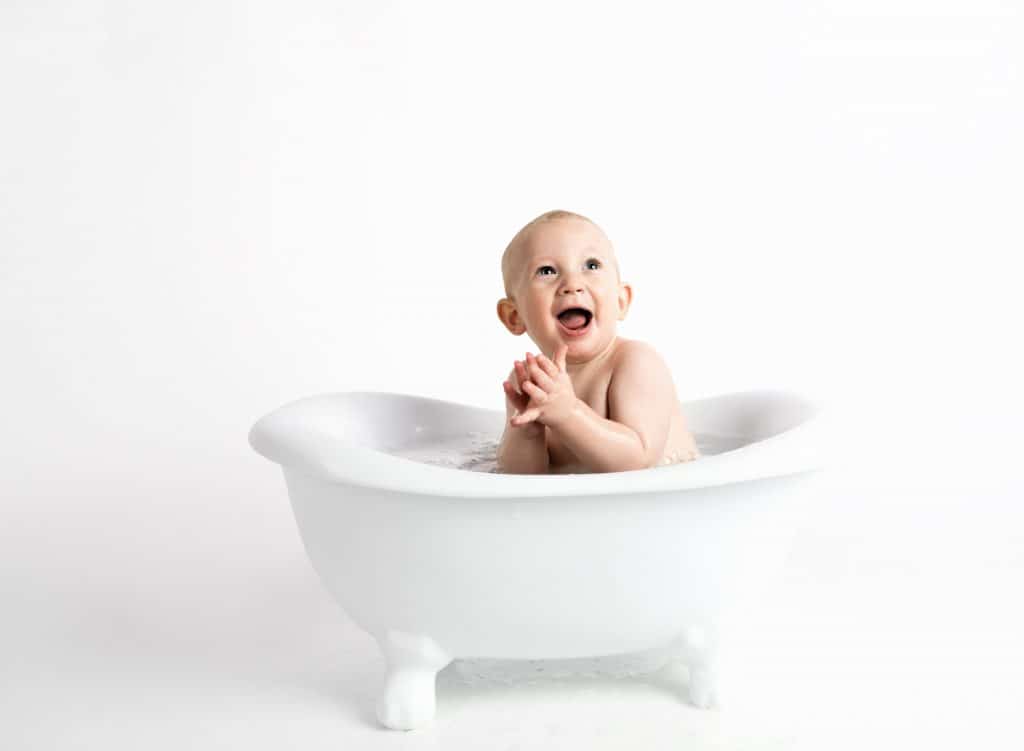
Never leave your baby unattended for any amount of time. A baby can drown in less than two inches of water.
If you’re going to be kneeling down by a tub, use a bath kneeler to save your knees. You’ll need a firm grip on your baby and a kneeler can help stabilize you while holding your wet baby. Never underestimate how slippery a wet baby can be!
If your baby is older and on the move, be sure to use a spout cover to keep them from hitting their head on the faucet.
When Do Babies Enjoy Baths?
Unfortunately, there isn’t a specific age when babies start enjoying baths. One of the critical factors is their temperament. Because this varies from baby to baby so much, some babies might enjoy the sensation of water from their earliest baths, while other babies take time to get used to the whole experience.
If your baby is one of the ones who need time, you can take things slowly and introduce them to bath time at a pace that specifically works for them.
Hopefully, these hacks can make bathing your baby easier! There are even some solutions for you even if he or she loved washing up before, but now the baby hates baths all of a sudden.
Stick with the routine for bath time and before you know it, your little one will love, or at the very least, not dread bath time!
FAQs About Bath Time and Your Baby
How often should I give my baby a bath?
It’s a good idea to bathe your baby 2-3 times a week using a gentle, soap-free cleanser. Bathing your baby too often can dry out their skin and strip away natural oils.
Can I use regular soap on my baby during bath time?
No, regular soap can be too harsh for your baby’s delicate skin. Use a mild baby soap or a soap-free cleanser instead.
What time is too late to give a baby a bath?
This is largely dependent on your schedule but, it’s generally recommended to avoid giving babies baths too close to bedtime, as it can over-stimulate them and make it difficult for them to sleep. A good time to give a baby a bath is during the morning or early evening hours. Avoid giving your baby a bath when they’re overtired or hungry, as this can cause stress and discomfort. Make sure that the bath time is not too long as it may make babies feel restless.
